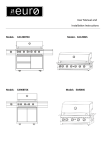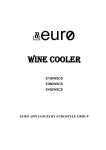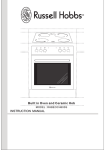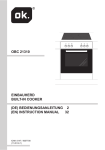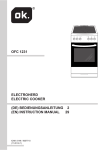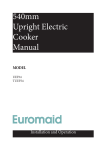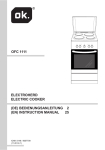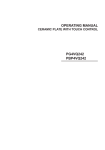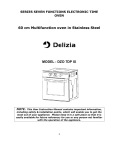Download EURO EP8060DS Instruction manual
Transcript
Double Oven Instruction Manual EP8060DS EURO APPLIANCES BY EUROSTYLE GROUP Contents Environmental note 3 Important safety information 4–6 Specifications Control panel Oven programmer/timer display 7 8 8 Setting and using the oven programmer/timer Selecting manual operation mode Setting the time of day The oven timer Setting the minute minder function Setting the duration function Setting the end cook function Setting the start and end time function 9 9 9 9 10 11 12 13 Selecting a cooking function and temperature Selecting manual operation mode Selecting a main oven function Main oven functions Oven operating light (main and secondary oven) Main oven thermostat control knob Selecting a secondary oven function Secondary oven thermostat control knob Cooking guidelines Warnings 14 14-15 15 15 15 16 16 16 16 17 Cleaning and maintenance Removable oven cavity roof liner Replacing the oven bulb Door removal Removal of the internal glass panel 18 18 18 19 19 Installation Electrical connection Connecting the mains supply cable Replacing the mains supply cable Installing the oven into the kitchen cabinet Positioning the appliance Ventilation requirements 20 20 21 22 23 23 24 My appliance isn’t working correctly 25-26 OVEN MAIN COOKING INSTRUCTION 27-28 2 Environmental note o The packaging materials that we use are environmentally friendly and can be recycled. o Please discard all packaging material with due regard for the environment 3 IMPORTANT SAFETY INFORMATION Your safety is of the utmost importance to our company. Please make sure that you read this instruction booklet before attempting to install or use the appliance. If you are unsure of any of the information contained in this booklet, please contact the Technical Department. General Information o This appliance is designed for domestic household use and can be built into a standard kitchen cabinet or housing unit. o IMPORTANT: The adjacent furniture or housing and all materials used in the installation must be able to withstand a minimum temperature of 85°C above the ambient temperature of the room it is located in, whilst in use. o Certain types of vinyl or laminate kitchen furniture are particularly prone to heat damage or discolouration at temperatures below the guidelines given above. o Any damage caused by the appliance being installed in contravention of this temperature limit, or by placing adjacent cabinet materials closer than 4mm to the appliance, will be the liability of the owner. o For use in leisure accommodation vehicles, please refer to the appropriate information given in the installation instructions for this appliance. o The use of this appliance for any other purpose or in any other environment without the express agreement of our company will invalidate any warranty or liability claim. o Your new appliance is guaranteed against electrical or mechanical defects, subject to certain exclusions that are noted in Conditions Of Guarantee. The foregoing does not affect your statutory rights. o Repairs may only be carried out by Service Engineers or their authorized service agent. Warning and safety instructions o This appliance complies with all current European safety legislation. We do wish to emphasise that this compliance does not remove the fact that the appliance surfaces will become hot during use and retain heat after operation. Child Safety o We strongly recommend that babies and young children are prevented from being near to the appliance and not allowed to touch the appliance at any time. 4 o If it is necessary for younger family members to be in the kitchen, please ensure that they are kept under close supervision at all times. General Safety o This appliance is not intended for use by persons (including children) with reduced physical sensory or mental capabilities, or lack of experience and knowledge, unless they have been given supervision or instruction concerning use of the appliance by a person responsible for their safety. o Do not place heavy objects on the oven door or lean on the oven door when it is open, as this can cause damage to the oven door hinges. o Do not leave heated oil or fat unattended, as this is a fire risk. o Do not place pans or baking trays directly on the base of the oven cavity, or line it with aluminium foil. o Do not allow electrical fittings or cables to come into contact with areas on the appliance that get hot. o Do not use the appliance to heat the room it is located in or to dry clothing. o Do not install the appliance next to curtains or soft furnishings. o Do not attempt to lift or move cooking appliances by using the oven door or handle, as this may cause damage to the appliance or result in injury to the person lifting the appliance. Cleaning o Cleaning of the oven should be carried out on a regular basis. o Great care should be taken whilst using this appliance and when following the cleaning procedure. o IMPORTANT: The appliance must be disconnected from the mains before following the cleaning procedure. 5 Installation This appliance must be correctly installed by a suitably qualified person, strictly in accordance with the manufacturer’s instructions. o We decline any responsibility for injury or damage, to person or property, as a result of improper use or installation of this appliance. o Heat, steam and moisture will be created during use of the appliance, take care to avoid injury and ensure that the room is adequately ventilated. If the appliance is going to be used for prolonged periods of time, then additional ventilation may be required. o Please consult with your qualified installer if you are in any doubt about the amount of ventilation that you will require. Declaration of conformity. o CE: Appliance conforming to the European directives 89/336/EEC, 93/68/EEC, 73/23/EEC and subsequent revisions and “RoHS” directive 2002/95/CE. o The manufacturer declares that the oven is built using certified materials and requires the appliance to be installed in accordance with the standards currently in force. This appliance must be used by a trained person for domestic purposes only. * The RoHS directive stands for “the restriction of the use of certain hazardous substances in electrical and electronic equipment”. This directive bans the placing on the EU market of new electrical and electronic equipment containing more than the agreed levels of lead, cadmium, mercury, hexavalent chromium, polybrominated biphenyl (PBB) and polybrominated diphenyl ether (PBDE) flame retardants. 6 Specifications Dimensions Height: 885 mm Width: 595 mm Depth: 565 mm Product specifications o o o o o Energy efficiency class: A LED full programmer 2 Cooling fans Thermostatically controlled grills Double-glazed removable doors Top oven: static oven and grill o 4 functions o Capacity: 36 litres Main oven: multifunction oven o 9 functions o Capacity: 60 litres Standard accessories o Removable side racks o 2 x Safety shelves o 2 x Enamel trays Electrical details Rated Voltage: 230 Vac 50 Hz Supply Connection: 30 A (double pole switched fused outlet with 3mm contact gap Max Rated Inputs: 4.95 kW Mains Supply Lead: 3 x 2.5 mm² or 4x1.5 mm² Oven Light Bulb: 25 W/300°C screw type pigmy For future reference please record the following information which can be found on the Rating Plate and the date of purchase which can be found on your sales invoice. The rating plate for your oven can be located by opening the oven door and looking on the right hand side of the oven chassis. 7 Control panel 2 4 11 12 0 0 14 0 0 0 5 2 0 5 2 50 50 0 0 2 0 0 2 100 100 150 1 150 3 5 6 7 8 9 10 13 1) Secondary oven thermostat control knob 2) Secondary oven operating light 3) Secondary oven function selection knob 4) Secondary oven power indicator light 5) Timer “minute minder” button 6) Timer “duration” button 7) Timer “end cook” button 8) Timer “manual operation” button 9) Timer “minus” button 10) Timer “plus” button 11) LED display 12) Main oven power indicator light 13) Main oven function selection knob 14) Main oven operating light 15) Main oven thermostat control knob Oven programmer/timer display 16) 17) 18) “Auto” function symbol “Minute minder” symbol “Manual operation” symbol. 8 15 Setting and using the oven programmer/timer Selecting manual operation mode After your appliance is connected to your mains supply for the first time, the numbers on the timer display will flash. Before you can select a cooking function or set a temperature, you must set the appliance into “manual operation” mode. o To select manual operation mode, press the “manual operation” button (8) on the control panel. Setting the time of day After setting your oven for manual operation, you should also set the time of day. o Use the “minus” button (9) and “plus” button (10) to adjust the time that appears in the display. After getting the display to the correct time, release the “minus” and “plus” buttons. After five seconds the time will fix in the display and you will be able to use your oven. o The “manual operation” symbol (18) will light on the oven programmer/timer display. Before first use o To remove any residue from the oven that may have been left from the manufacturing process, you should select either the fan or conventional oven function and turn the thermostat dial to its maximum temperature setting. For the secondary oven you should select the conventional oven function and select its maximum temperature setting. o It is perfectly normal for a smell to be produced during this process. o You should make sure that any windows in the room are left open during this process. o It is advisable for you not to remain in the room whilst the burning off process is taking place. o You should leave each oven on maximum setting for 30 – 40 minutes. o IMPORTANT: You should not burn off both ovens simultaneously. 9 Setting the minute minder function (main and secondary oven) You are able to set the minute minder at any time, regardless of whether an oven function has been selected. You can set a period of time using the minute minder function and an alarm will sound when this period of time has elapsed. o Press the “minute minder” button (5), the display will show a value of 00:00. Set the period of time that you wish the minute minder to countdown for, by using the “minus” (9) and “plus” (10) buttons. o Once the display has got to your desired countdown time, let go of the “minus” and “plus” buttons. The minute minder symbol (17) will appear on the timer display. o Once a countdown time has been set, it is possible to shorten or lengthen the time by using the “minus” or “plus” buttons. o An alarm will sound when the countdown time has elapsed. The alarm can be silenced by pressing the “minute minder” button or “manual operation button” o Important: The oven will continue to heat once the alarm has been silenced. If you have finished cooking, then you should turn the oven function selector and thermostat control knob to 0. 10 Setting the duration function (main oven only) This function will allow you to set a countdown time similar to the minute minder function. However the oven will no longer continue to heat, once the countdown period has elapsed. o Use the main oven thermostat control knob (15) to set the temperature that you require. The manual operation symbol (18) will appear on the display. o Use the main oven function selection knob (13) to select the mode of cooking that you require. o It is then possible to set the duration of the cooking time that you require. o Press the “duration” button (6) and the display will show a value of 00:00. Set the period of time that you wish the duration function to countdown for, by using the “minus” (9) and “plus” (10) buttons. o Once the display has got to your desired countdown time, let go of the “minus” and “plus” buttons. The countdown will start immediately and the word AUTO will appear on the timer display. o Once a countdown time has been set, it is possible to shorten or lengthen the time by using the “minus” or “plus” buttons. o An alarm will sound when the countdown time has elapsed and the oven will switch off. The word AUTO will flash and the heating symbol will disappear. o To silence the audible signal and return the oven to manual operation mode, once the duration function has been used. You should press the “manual operation” button, the word AUTO will disappear from the display and the manual operation symbol will appear instead. o Important: If you do not turn the thermostat control knob and main oven function selection knob to 0. Then the appliance will continue to operate as soon as you press the “manual operation” button. 11 Setting the end cook function (main oven only) This function is similar to the duration function, however instead of selecting a period of time that you wish the oven to switch off after. You select the time of day that you wish the oven to switch off at. o Use the main oven thermostat control knob (15) to set the temperature that you require. The manual operation symbol (18) will appear on the display. o Use the main oven function selection knob (13) to select the mode of cooking that you require. o Press the “end cook” button (7) and the display will show a value of 00:00. Set the time of day that you wish the oven to stop cooking at by using the “minus” (9) and “plus” (10) buttons. The timer will calculate how long the cooking time will be, based on the time of day that you have selected and show it on the display. o Once the display has got to the time of day that you want the oven to stop cooking at, let go of the “minus” and “plus” buttons. The countdown will start immediately and the word AUTO will appear on the timer display. o When the time is set, it can be modified by pressing the “minus” and “plus” buttons. o When the time of day reaches the end of cooking time that you set, the oven will switch off and an alarm will sound. The word AUTO will flash and the heating symbol will disappear. o To silence the audible signal and return the oven to manual operation mode, once the end cook function has been used. To do this you should press the “manual operation” button, the word AUTO will disappear from the display and the manual operation symbol will appear instead. o Important: If you do not turn the thermostat control knob and oven function selection knob to 0. Then the appliance will continue to operate as soon as you press the “manual operation” button. 12 Setting the start and end time function (main oven only) This function will allow you to set a time in the future that the oven switches on at and a time that the oven will switch off at. o Use the main oven thermostat control knob (15) to set the temperature that you require. The manual operation symbol (18) will appear on the display. o Use the main oven function selection knob (13) to select the mode of cooking that you require. o Press the “duration” button (6) and the display will show a value of 00:00. Set the period of time that you wish to cook for, by using the “minus” (9) and “plus” (10) buttons. The word AUTO will appear on the timer display. o Immediately press the “end cook” button (7) and the timer display will show the value 00:00. Set the time of day that you want the oven to switch off at, using the “minus” and “plus” buttons. o The oven will calculate what time it needs to switch on at, so that your food will cook for the length of time that you selected. It will automatically switch itself on, once it reaches the time of day that it has calculated. o When the time of day reaches the end of cooking time that you set, the oven will switch off and an alarm will sound. The word AUTO will flash and the heating symbol will disappear. o To silence the audible signal and return the oven to manual operation mode, once the start and end time function has been used. To do this you should press the “manual operation” button, the word AUTO will disappear from the display and the manual operation symbol will appear instead. o Important: If you do not turn the thermostat control knob and oven function selection knob to 0. Then the appliance will continue to operate as soon as you press the “manual operation” button. Adjusting the audible signal o To adjust the level of the audible signal, when it is sounding, press the minus button and it will adjust through the 3 sound levels. Release the minus button and the sound level of the audible signal will be set. 13 Selecting a cooking function and temperature Selecting manual operation mode After your appliance is connected to your mains supply for the first time, the numbers on the timer display will flash. Before you can select a cooking function or set a temperature, you must set the appliance into “manual operation” mode. o To select manual operation mode, press the “manual operation” button (8) on the control panel. Selecting a main oven function 0 The oven function selector knob should be used to select the particular mode of cooking that you require. The appliance will utilise different elements within the oven cavity, depending on the oven function that you select. When a function is selected, the power indicator light will come on. This appliance have 9 grill functions for your choosing. DEFROST MODE: The fan runs without heat to reduce the defrosting time of frozen foods. The time required to defrost the food will depend on the room temperature, the quantity and type of food. Always check food packaging for the defrosting instructions. CONVENTIONAL OVEN (top and lower element): This method of cooking provides traditional cooking, with heat from the top and lower elements. This function is suitable for roasting and baking on one shelf only. FAN OVEN: This method of cooking uses the circular element whilst the heat is distributed by the fan. This results in a faster and more economical cooking process. The fan oven allows food to be cooked simultaneously on different shelves, preventing the transmission of smells and tastes from one dish onto another. HALF GRILL: This method of cooking utilises the inner part only of the top element, which directs heat downwards onto the food. This function is suitable for grilling small portions of bacon, toast and meat etc. FULL GRILL: This method of cooking utilises the inner and outer parts of the top element, which directs heat downwards onto the food. This function is suitable for grilling medium or large portions of sausages, bacon, steaks, fish etc. 14 FAN AND GRILL: This method of cooking utilises the top element in conjunction with the fan, which helps to provide a quick circulation of heat. This function is suitable where quick browning is required and “sealing” the juices in, such as steaks, hamburgers, some vegetables etc. FAN AND LOWER ELEMENT: This method of cooking utilises the bottom element in conjunction with the fan, which helps to circulate the heat. This function is suitable for sterilizing and preserving jars. This method of cooking is traditional cooking method, the heat from the top and lower elements. The fan can help the heat to recycle and make the barbecue more symmetrical. This mode use the back, lower element and the fan to work at the same time. Main oven thermostat control knob The oven thermostat control knob sets the required temperature of the oven. It is possible to regulate the temperature within a range of 50 250°C. 50 250 200 Turn the control knob clockwise. 100 150 Oven operating light (main and secondary oven ) This light will come on to indicate that the oven’s heating elements are in operation. The light will turn off when the temperature set on the thermostat control knob has been reached. It will cycle on and off throughout the cooking time. 250 50 You should not place food inside the cavity, until the correct cooking temperature has been reached. 200 100 150 15 Selecting a secondary oven function and temperature The secondary oven function selection knob should be used to select the particular mode of cooking that you require. The appliance will utilise different elements within the oven cavity, depending on the oven function that you select. When a function is selected, the secondary oven power indicator light will come on. Secondary oven thermostat control knob 250 50 200 The oven thermostat control knob sets the required temperature of the oven. It is possible to regulate the temperature within a range of 50 250°C. 100 150 Turn the control knob clockwise. Cooking guidelines o Please refer to the information given on food packaging for guidance on cooking temperatures and times. Once familiar with the performance of your appliance, temperatures and times can be varied to suit personal preference. o If you are using the fan oven function, then you should follow the information given on the food packaging for this particular mode of cooking. o Make sure that frozen foods are thoroughly thawed before cooking, unless the instructions on the food packaging advise that you can “cook from frozen”. o You should pre-heat the oven and not place food inside of it until the oven operating light has gone off. You can choose not to pre-heat when using the fan oven mode; however you should extend the cooking time given on the food packaging by approximately ten minutes. o Before cooking, check that any accessories that are not required are removed from the oven. o Place cooking trays in the centre of the oven and leave gaps between the trays to allow air to circulate. o Try to open the door as little as possible to view the dishes. o The oven light will remain on during cooking. 16 Warnings o Keep the oven door closed when using any of the grill functions. o Do not use aluminium foil to cover the grill pan or heat items wrapped in aluminium foil under the grill. The high reflectivity of the foil could potentially damage the grill element. o You should also never line the base of your oven with aluminium foil. o During cooking, never place pans or cookware directly onto the o Bottom of your oven. They should always be placed on the shelves provided. o The grill heating element and other internal components of the oven becomes extremely hot during operation, avoid touching it inadvertently when handling the food which you are grilling. o Important: Be careful when opening the door, to avoid contact with hot parts of the oven and steam. o o The drip tray handle should only be used to reposition the drip tray and NOT for removing it from the oven cavity. When removing the drip tray, you should ALWAYS use an oven glove. o The drip tray handle should not be left in position when the appliance is switched on. o A steam cleaner is not to be used. o Warning: Accessible parts may become hot during use. Young children should kept well away when in use. o Do not use harsh abrasive cleaners or metal scrapers to clean the oven door glass as this can scratch the surface, which may result in the oven glass shattering. 17 Cleaning and maintenance Cleaning operations must only be carried out when the oven is cool. The appliance should be disconnected from your mains supply before commencing any cleaning process. o The oven should be thoroughly cleaned before it is operated for the first time and after each use. This will avoid residual food stuffs becoming baked on the oven cavity. After residues have been baked on several times, they are far more difficult to remove. o Never clean the oven surfaces by steam cleaning. o The oven cavity should only be cleaned with warm soapy water, using either a sponge or soft cloth. No abrasive cleaners should be used. o Any stains that may appear on the bottom of the oven will have originated from food splashes or spilt food, these splashes occur during the cooking process. These could possibly be a result of the food being cooked at an excessively high temperature or being placed in cookware that is too small. o You should select a cooking temperature and function that is appropriate for the food that you are cooking. You should also ensure that the food is placed in an adequately sized dish and that you use the drip tray where appropriate. o Outer parts of the oven should only be cleaned with warm soapy water, using either a sponge or soft cloth. No abrasive cleaners should be used. o If you use any form of oven cleaner on your appliance, then you must check with the manufacturer of the cleaner that it is suitable for use on your appliance. o Any damage that is caused to the appliance by a cleaning product will not be fixed by our company free of charge, even if the appliance is within the guarantee period. Replacing the oven bulb IMPORTANT: The oven must be disconnected from your mains supply before you attempt to either remove or replace the oven bulb. o Remove all oven shelves, the drip tray and the side rack that is on the same side as the oven light. o Using a screwdriver, remove the lamp cover (1). o Unscrew the bulb (2) clockwise remove it from its holder o Replace the bulb with a 25W/300°C, screw type pigmy o Do not use any other type of bulb o Place the lamp cover back into position. There is a curve on one side of the cover; this should be on the right hand side as the cover goes back into place. 18 Door removal In order to obtain easier access to the oven chamber for cleaning, it is possible to remove the door. To do this, tilt the safety catch part of the hinge upwards. Close the door lightly, lift and pull it out towards you .In order to fit the door back on to the cooker , do the inverse. When fitting, ensure that the notch of the hinge holder. After the door is fitted to the oven, the safety catch should be carefully lowered down again. lf the safety catch is not set it may cause damage to the hinge when closing the door. As shown figure 1 figure 1 Removal of the internal glass panel Unscrew and unfasten the bracket latch that is in the corner at the top of the door .Next take out the glass from the second blocking mechanism and remove. After cleaning, insert and block the glass panel, and screw in the blocking mechanism. As shown figure 2 figure 2 o Take care not to dislodge the hinge locking system when removing the door, as the hinge mechanism has a strong spring. o Do not immerse the door in water at any time. 19 INSTALLATION The installation must be carried out by a suitably qualified person, in accordance with the current version of the following. o o o o o UK Regulations and Safety Standards or their European Norm Replacements. Building Regulations (issued by the Department of the Environment). Building Standards (issued by the Scottish Development Department). IEE Wiring Regulations. Electricity At Work Regulations. Before connecting the appliance, make sure that the supply voltage marked on the Rating Plate corresponds with your mains supply voltage. WARNING: THIS APPLIANCE MUST BE EARTHED. o This appliance should be wired into a 30 A double pole switched fused spur outlet, having 3 mm contact separation and placed in an easily accessible position adjacent to the appliance. The spur outlet must still be accessible even when your oven is located in its housing to enable the appliance to be disconnected from the mains supply. o To connect the oven power cord, loosen and remove the cover on the terminal block, in order to gain access to the contacts inside. Make the connection, securing the cord in place with the cable clamp provided and then immediately close the terminal block cover again. o If you have to change the oven power cord, the earthing (yellow/green) conductor must always be 10 mm longer than the line conductors. o Care must be taken to ensure that the temperature of the mains supply cable does not exceed 50°C. o If the mains supply cable is damaged, then it must be replaced by an appropriate replacement which can be obtained from the Spares Department. o Cable type: H05 VV-F 3 core x 4 mm² 20 Connecting the mains supply cable o The mains terminal block is located on the rear of the oven and the terminals are accessible by removing the terminal block cover. You should remove the cover screw to access this. o The cable connections must be made in accordance with the diagram below: CONNECTION DIAGRAM 1 2 3 Caution! Voltage of heating elements 230V 5 Caution! ln the event of any connection the safety wire must be connected to the 4 Recommended type of connection lead PE terminal For 230 V earthed one-phase 1 connection, bridges connect 1-2-3 terminals and 4-5 terminals, safety wire to . 2 For 400/230V earthed two-phase connection, bridges connect 2-3 terminals and 4-5 terminals, the safety wire to . 1 2 3 5 4 2 3 L1 L2 5 4 PE N L1 PE H05VV-F3G4 N 1 H05VV-F4G2.5 L1=R,L2=S,L3=T,N=earth terminal, PE= safety wire terminal 1, 2 and 3 are the live connection, 4 and 5 are the neutral connection and the remaining one is the earth connection. o The live wire MUST be placed in connection number 1. The neutral wire MUST be placed in connection number 4. The earth wire MUST be placed in the connection marked with the symbol. o The brass links must be positioned as marked in the diagram above and once established ALL terminal screws must be tightened down firmly. O If when the oven is first switched on, it does not function correctly, you should recheck that the terminal screws are all fully tightened between the links. This should be done before contacting our Service Department . IMPORTANT: The appliance must NOT be connected to the mains supply by means of a 16A plug and socket. The cable can be looped if necessary, but make sure that is not kinked or trapped when the oven is in position. Care must be taken to avoid the cable being in contact with hot parts of the appliance. 21 Replacing the mains supply cable If the mains supply cable is damaged, then it must be replaced with a suitable replacement. The mains supply cable should be replaced in accordance with the following instructions: o Switch the appliance off at the control switch. o Open the terminal block on the back of the oven. o Unscrew the terminal screws fixing the cable. o Replace the cable with one of the same length and in accordance with the specification. o The “green-yellow” earth wire must be connected to the terminal marked It must be about 10 mm longer than the live and neutral wires. . o The “blue” neutral wire must be connected to the terminal marked with letter (N) - the live wire must be connected to the terminal marked with letter (L). The connection cable must be secured in a strain-relief clamp. 2 1 Warning! Remember to connect the safety circuit to the connection box terminal marked with The electricity supply for the oven must have a safety switch which enables the power to be cut off in case of emergency. The distance between the working contacts of the safety switch must be at least 3mm. 22 . Installing the oven into the kitchen cabinet Positioning the appliance o Ensure that the aperture that you will be fitting the oven into is of the size given in the above diagram. o The oven must be fitted into an oven housing with the ventilation cut-outs shown in the “Ventilation requirements” section on the next page. o Ensure that the rear panel of the furniture housing unit has been removed. 23 Ventilation requirements (Figure shows the ventilation and cut-out requirements for the installation of the appliance into a tall housing unit). Ensure that the oven has been securely fixed into the housing unit. The fixing of the oven into the housing is made by using four screws. These should be screwed through the oven cabinet and into the housing unit. 24 My appliance isn’t working correctly o The oven isn’t coming on. * Check that the oven is in manual operation mode. * Check that you have selected a cooking function and a cooking temperature. o There appears to be no power to the oven and grill. * Check that the appliance has been connected to the electrical mains supply correctly. * Check that the mains fuses are in working order. * Check that the operating instructions for setting the time of day and putting the appliance into manual operation mode have been followed. o The grill function works but the main oven does not. * Check that you have selected the correct cooking function. o The grill and top oven element is not working, or cuts out for long periods of time during use. * Allow the oven to cool for approximately 2 hours. Once cool, check whether the appliance is again working properly. o My food is not cooking properly * Ensure that you are selecting the correct temperature and the correct cooking function for the food that you are cooking. It may be appropriate to adjust your cooking temperature by plus or minus 10°C, to achieve the best cooking results. o My food is not cooking evenly * Check that the oven has been installed correctly and is level. * Check that the correct temperatures and shelf positions are being used. 25 o The oven light is not working * Refer to page 19 and follow the “Replacing the oven bulb” section. o I am getting condensation in my oven * Steam and condensation is a natural by product of cooking any food with high water content, such as frozen food, chicken etc. * You may get condensation in the oven cavity and forming between the oven door glasses. This is not necessarily a sign that the oven is not working correctly. * Do not leave food in the oven to cool after it has been cooked and the oven has been switched off. * Use a covered container, where practical, when cooking to reduce the amount of condensation that forms. IMPORTANT: If your appliance appears not to be operating correctly, please contact the dealer。 DO NOT ATTEMPT TO REPAIR THE APPLIANCE YOURSELF. Please note that if an engineer is asked to attend whilst the product is under guarantee and finds that the problem is not the result of an appliance fault, then you may be liable for the cost of the call out charge. The appliance must be accessible for the engineer to perform any necessary repair. If your appliance is installed in such a way that an engineer is concerned that damage will be caused to the appliance or your kitchen, then he will not complete a repair. This includes situations where appliances have been tiled in, sealed in with sealant, have wooden obstructions placed in front of the appliance, like plinths. Or any installation other than the one specified by our company has been completed. 26 Oven main function cooking instruction: use the back elements and fan working mode Tray Position Temperature setting Finished Time kg PREHEAT (minutes) Beef 1 15 2 200℃ 40-50 Pork 1 15 2 200℃ 70-80 Chicken 1.2 15 2 200℃ Duck 1.5 15 2 200℃ 50-60 Steak 0.8 10 2 180℃ 20-30 Bread 0.5 10 2 200℃ 35-45 FOOD WEIGHT mins 50-60 use the upper and lower elements working mode: WEIGHT kg PREHEAT minutes Tray Position Temperature setting Finished Time Beef 1 15 2 220℃ 40-50 Pork 1 15 2 220℃ 70-80 Chicken 1.2 15 2 220℃ 50-60 Duck 1.5 15 2 220℃ 50-60 Steak 0.8 10 2 220℃ 20-30 Bread 0.5 10 2 220℃ 35-45 FOOD (minis) use the upper element+ fan working mode WEIGHT kg PREHEAT minute Tray Position Temperature setting Finished Time Beef 0.8 10 3 200℃ 20-25 Pork 0.8 10 3 200℃ 25-30 Chicken 1.2 10 3 200℃ 40-45 Banger 0.6 10 3 200℃ 15-20 Hamburger 0.6 10 3 200℃ 15-20 corn Vegetable 1.2 10 3 200℃ 20-25 0.5 10 4 200℃ 15-20 FOOD 27 (minis) Use the upper element working mode: WEIGHT PREHEAT minute Tray Position Temperature setting Finished Time Beef 0.8 3 250℃ 20-25 Pork 0.8 10 10 3 250℃ 25-30 Chicken 1.2 10 3 250℃ 40-45 Banger 0.6 10 4 250℃ 15-20 Hamburger 0.6 10 4 250℃ 15-20 Corn 1.2 10 3 250℃ 20-25 Vegetable 0.5 10 4 250℃ 15-20 FOOD kg mins Use lower element + fan working mode Temperature Finished Time mins setting WEIGHT kg PREHEAT minute Tray Position Bread 0.5 10 1 200℃ 10-15 Pizza 0.7 15 2 200℃ 40-45 Baking power Cake 1.5 15 1 180℃ 35-40 biscuit 0.7 15 2 180℃ 20-25 Fruit Salad Pie 1.2 10 3 250℃ 20-25 FOOD 28 Eurostyle Group trading as Euro Appliances Service Line: (08) 8165 1012 Fax: (08) 8165 1018 Email: [email protected]





























